Introduction
Cancer is a complex disease influenced by genetic, environmental, and lifestyle factors. Diet plays a significant role in either preventing or promoting the development of cancer cells. While no single food can cause cancer outright, certain foods and beverages may increase your risk or trigger the growth of cancerous cells when consumed excessively or regularly. Understanding which items might be harmful helps you make informed dietary choices to stay healthier. Here are nine foods and beverages that can potentially stimulate cancer cell growth.
1. Processed Meats
Processed meats such as sausages, bacon, ham, and deli meats often contain preservatives like nitrates and nitrites. These chemicals can convert into carcinogenic compounds under certain conditions, especially when cooked at high temperatures. The World Health Organization (WHO) classifies processed meats as a Group 1 carcinogen, meaning they are linked to an increased risk of colorectal cancer.
2. Red Meats
While red meat — including beef, pork, and lamb — can be a good source of protein and nutrients, consuming large quantities regularly may elevate cancer risk. Cooking red meat at high heats (grilling, frying, or barbecuing) produces heterocyclic amines (HCAs) and polycyclic aromatic hydrocarbons (PAHs), which are known carcinogens associated with stomach and colorectal cancers.
3. Sugary Foods and Drinks
High sugar intake leads to obesity, a significant risk factor for various types of cancer, including breast, colon, and pancreatic cancers. Sugary beverages like sodas, energy drinks, and sweetened juices cause rapid spikes in blood sugar levels, promoting inflammation and insulin resistance, both of which can create an environment conducive to cancer cell growth.
4. Alcohol
Alcohol consumption has been linked to several cancers, including mouth, throat, esophagus, liver, colon, and breast cancers. Alcohol metabolites can damage DNA, impair immune function, and increase levels of oxidative stress, all of which can trigger or promote cancer development. Limiting alcohol intake is a crucial step in reducing cancer risk.
5. Fried and Grilled Foods
Cooking foods at high temperatures, especially frying and grilling, leads to the formation of HCAs and PAHs, known carcinogens. These compounds can bind to DNA in cells, causing mutations that may result in cancer. To minimize risk, opt for baking, steaming, or boiling foods instead.
6. Artificial Sweeteners and Additives
Some artificial sweeteners and food additives have been studied for their potential carcinogenic effects. Certain chemicals used as preservatives or flavor enhancers, like sodium nitrite, may form carcinogenic compounds in the body. Although definitive evidence is still debated, moderation is advisable when consuming processed foods containing these additives.
7. Highly Salted Foods
Excessive salt intake has been associated with an increased risk of gastric (stomach) cancers. Salty foods, particularly preserved and pickled items, can damage the stomach lining and promote the growth of Helicobacter pylori bacteria, which is linked to gastric cancer.
8. Trans Fats and Hydrogenated Oils
Trans fats, found in some processed snacks, baked goods, and fried foods, promote inflammation and oxidative stress, creating conditions favorable for cancer development. Many health authorities recommend avoiding trans fats altogether for overall health and cancer prevention.
9. Microwave Popcorn and Packaged Snacks
Some microwave popcorn brands and packaged snacks contain artificial flavorings and diacetyl, chemicals that, when inhaled or ingested in large quantities, may pose carcinogenic risks. While the direct link to cancer requires more research, limiting intake of heavily processed, artificially flavored products is a prudent choice.
Conclusion
While a balanced diet rich in fruits, vegetables, whole grains, and lean proteins is essential for reducing cancer risk, awareness of foods and drinks that may promote cancer cell growth is equally important. Limiting intake of processed meats, high-sugar products, excessive alcohol, and foods prepared at high temperatures can make a significant difference in your overall health. Always remember, moderation is key, and adopting a healthy lifestyle alongside dietary mindfulness dramatically lowers your chances of developing cancer. Make informed choices today for a healthier tomorrow.












